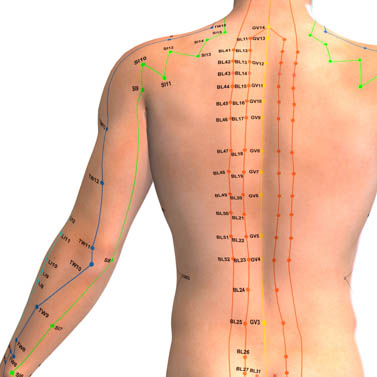Acupuncture effectively relieves inflammation and swelling of the nose for patients with allergic rhinitis. The condition involves inflammation of the nasal membranes leading to various symptoms: stuffy nose, runny nose, itching, postnasal drip, headache, fatigue, red eyes, sneezing. Yintang needled on a doll. Research published in the International Journal of Traditional Chinese Medicine investigated traditional acupuncture and a new procedure based on acupuncture techniques. Both approaches to patient care were effective in relieving chronic allergic rhinitis.

The traditional acupuncture group received treatment with 0.30 mm X 40 mm acupuncture needles. The primary acupuncture points employed in the investigation were:
Yintang (extra point)
Fengchi (GB20)
Fengfu (DU16)
Zusanli (ST36)
Secondary acupuncture points included:
Shangxing (DU23)
Hegu (LI4)
Feishu (BL13)
Pishu (BL20)
Shenshu (BL23)
Sanyinjiao (SP6)
The acupuncture sessions involved the selection of 1 primary acupuncture point combined with 1 - 2 secondary acupuncture points, based on patient differential diagnoses. The treatment duration was 4 consecutive weeks at a rate of 2 times per week for a grand total of 8 acupuncture treatments.
The new procedure was applied to a separate study group other than that of the traditional acupuncture group. The procedure involved acupuncture needle stimulation of the sphenopalatine ganglion. The technique was innovated by Prof. Li Xinwu, former Beijing Tongren Hospital director of Otolaryngology Head and Neck Surgery. The research documents that approximately 130,000 patients have undergone this procedure for the treatment of allergic rhinitis. This procedure requires special training on the part of the practitioner.
Stimulation of the sphenopalatine ganglion using an acupuncture needle is applied with the patient in a seated position. A 0.35 mm X 60 mm acupuncture needle is applied to a point located at the seam between the lower edge of the zygomatic arch and the mandibular coronoid to a depth of the sphenopalatine ganglion. The needle penetrates the masticatory muscle group, the masseter and temporalis muscles, and enters from the pterygomaxillary split. The treatment was applied 1 - 2 times per week for 4 consecutive weeks. Back shu point diagram with BL points of the back.
The research was conducted at the Xiyuan Hospital of China Academy of Traditional Acupuncture with a sample size of 50 patients. Before and after treatment, an assessment of subjective and objectives indices were evaluated. A Rhinoconjunctivitis Quality of Life Questionnaire (RQLQ) was used. A rhinoscope was used to evaluate swelling. Clinical evaluation of signs and symptoms were recorded, including a 1 month follow-up after completion of treatments.
The traditional acupuncture and sphenopalatine ganglion stimulation groups demonstrated significant improvements marked by both objective and subjective positive patient outcomes. Statistically, the sphenopalatine ganglion stimulation group outperformed the traditional acupuncture group. From a clinical perspective, this new technique is best suited for the hospital setting due to its aggressive nature. Traditional acupuncture demonstrates significant positive patient outcomes and is well suited to a multiplicity of clinical settings due to its gentle nature.
References:
Bousquet J,Khaltaev N,Cruz A A,et al. Allergic Rhinitis and its Impact on Asthma (ARIA) 2008 update (in collaboration with the World Health Organization,GA(2)LEN and AllerGen)[J]. Allergy,2008,63(S86):S8-S160.
Sphenopalatine ganglion stimulation with acupuncture for perennial allergic rhinitis: A non-randomized traditional Chinese acupuncture (verum acupuncture) controlled pilot trial. (2015). International Journal of Traditional Chinese Medicine, 37(5), 396-400.

![Diseases, Symptoms, tcm, [tcmwindow.com]](/uploadFile/adImg/2015/11/11/f5cbfcc0-4df5-4646-9b9a-f316651a0199.jpg)





